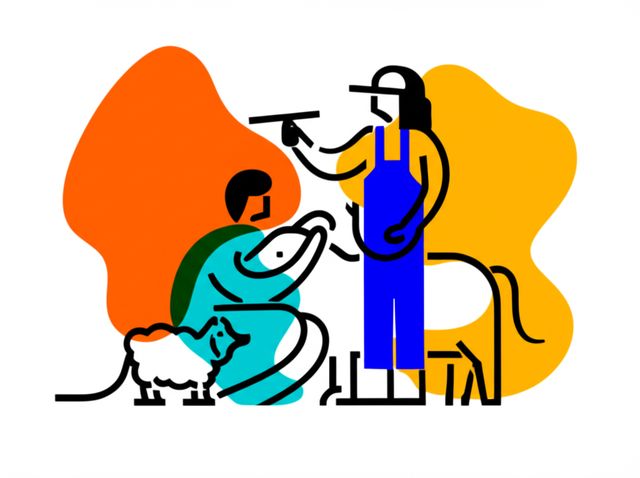Animal Breeder
Animal Breeders play a vital role in the management and improvement of animal populations. They use their knowledge of genetics, reproduction, and animal husbandry to breed animals that meet specific goals, such as increased production, improved quality, or resistance to disease. Animal Breeders work with a variety of animals, including livestock, companion animals, and laboratory animals.
Becoming an Animal Breeder
There are several paths to becoming an Animal Breeder. Many Animal Breeders have a bachelor's degree in animal science, animal breeding, or a related field. Others may have a background in veterinary medicine or agriculture. In addition to formal education, Animal Breeders typically gain experience working with animals on farms, ranches, or in research settings.
Skills and Knowledge
Animal Breeders need a strong understanding of genetics, reproduction, and animal husbandry. They also need to be able to collect and analyze data, and to make sound decisions about breeding programs. In addition, Animal Breeders must be able to work independently and as part of a team, and they must be able to communicate effectively with farmers, ranchers, and other stakeholders.
Day-to-Day Responsibilities
The day-to-day responsibilities of an Animal Breeder can vary depending on the type of animals they work with and the size and scope of their operation. However, some common tasks include:
- Collecting and analyzing data on animal performance
- Developing and implementing breeding programs
- Selecting and mating animals for breeding
- Monitoring the health and welfare of animals
- Working with farmers and ranchers to achieve breeding goals
Career Growth
Animal Breeders can advance their careers by taking on more responsibilities within their current role or by moving into management positions. Some Animal Breeders may also choose to pursue advanced degrees in animal science or a related field.
Personal Growth Opportunities
Animal Breeding can provide opportunities for personal growth and development. Animal Breeders can learn about the latest advances in animal genetics and reproduction, and they can gain valuable experience working with animals. Animal Breeders can also develop their leadership and communication skills, and they can learn how to work independently and as part of a team.
Challenges
Animal Breeding can be a challenging but rewarding career. Animal Breeders may face challenges such as working with animals that are sick or injured, or dealing with the death of an animal. Animal Breeders may also face challenges related to the weather or to market conditions. However, the rewards of Animal Breeding can be great, and Animal Breeders can make a real difference in the lives of animals and humans.
Self-Guided Projects
Students who are interested in pursuing a career in Animal Breeding can complete several self-guided projects to better prepare themselves for this role. These projects can include:
- Volunteering at a local animal shelter or rescue organization
- Working on a farm or ranch
- Participating in an animal science club or organization
- Reading books and articles about animal genetics and reproduction
- Taking online courses in animal science or a related field
Online Courses
Online courses can be a great way for students to learn about animal breeding and to prepare for a career in this field. Online courses can provide students with the opportunity to learn at their own pace and on their own schedule. Online courses can also provide students with the opportunity to interact with other students and with instructors who are experts in the field of animal breeding. Online courses can be a great way to supplement traditional education or to gain new skills and knowledge.
There are many different online courses available that can help students to learn about animal breeding. These courses can cover a variety of topics, including genetics, reproduction, animal husbandry, and breeding program design. Online courses can also provide students with the opportunity to gain hands-on experience through projects and assignments. Online courses can be a great way for students to learn about animal breeding and to prepare for a career in this field.
However, it is important to note that online courses alone are not enough to prepare someone for a career in Animal Breeding. Animal Breeders need to have a strong foundation in animal science and practical experience working with animals. Online courses can be a helpful learning tool, but they cannot replace hands-on experience.


